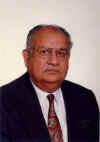|
|
||||
|
Ambassador of Nepal Ambassador of Pakistan Ambassador of Sri Lanka
History Made Easy South Asian Memories
|
|
|
||
|
the-south-asian.com December 2000 |
||||
|
Page 2 of 2
Mr. Naresh Chandra Ambassador of India to the U.S.
(continued from page 1) What would you ideally like to see happening in South Asia in the coming decades We should avoid wasting time and get on with the business of economic development. India’s rate of growth maybe good in a relative sense, but it is nowhere near our potential. People may applaud our ideas and our culture but unless we make money and provide a market where others can come and make money – there will be no business. The concentration on economic growth should not be lost. We are perceived as slow, obstructive, with an inefficient and outmoded bureaucracy. This is the biggest drawback in attracting foreign investment. This has to be changed. We have to streamline our administration, cut down Government, and improve discipline. The ASEAN members are doing well – they have learnt from their past experiences. Leisure In Washington’s winters, I enjoy watching TV – otherwise I enjoy walking, reading, and solving crosswords. Once I return to Delhi, I will be spending a lot of time in the Delhi Golf Club. In Washington I don’t have enough time for golf. In fact I don’t have too much time for leisure here – there is too much happening in Washington. Family I have a very large family for a bachelor. I come from a large family – I am my father’s seventh child. Once I retire I would like to sit at home, relax, talk to my relatives and their children and keep up with what’s happening in the family. People Admired The most decisive influence was that of my father – he was a very liberal man. He maintained that in the end it is only the goodwill that you leave behind that matters – it is permanent. On a more macro level it would be Gandhi. People who have left lasting impressions in South Asia There have been many – Gandhi, Nehru, Jinnah, Abul Kalam Azad, Tilak, Ram Mohan Roy, Liaqat Ali Khan. Some of the British like William Bentinck and Curzon also made positive contributions in the region. ICS officers, as professional administrators, also left a lasting impression. They set the standards of administration; many of their circulars and rules and regulations were people-oriented and designed to protect vulnerable sections of society from people they referred to as ‘rascals’ or ‘goondas’. There was a Goonda Act in Uttar Pradesh – I have administered it. There was a desire to use administration to protect ordinary people. In fact, the first half of 20th century was an extraordinary period for entire South Asia. There were such great people, people of eminence, of articulation, intellect – it was a tremendously creative period for India and we had fantastic leadership in all communities – Hindus, Muslims, Parsis, Sikhs. But no longer. Do we have quality leadership / leaders with vision Good leaders are nowhere. That’s because you cannot have it both ways. If you decentralise and go for people’s representation and abide by the principle that politics is local – then you get an aggregate of local leaders and regional parties and not people of national stature with charisma. I think in certain fields, especially in diverse nations, we do need leaders of national stature who are able to say things in moderation and in a calm tone that appeals to a vast number of people. Otherwise you get an aggregate of small personalities. Qualities appreciated in others In the Indian context, it would make such a difference if public servants were helpful and considerate. Most are not concerned about the convenience of the people they are serving. The counter clerk in a bank, for example, is seldom bothered about the length of the queue – in fact the greater the length of the queue the more powerful he feels – there is no desire to serve. People are either kept waiting or asked to make repeated visits. A Transport survey expert once told me that half the traffic on the roads of Delhi, Bombay and Calcutta, is harassment traffic, which means that the person in the vehicle does not want to be there but he is forced to be out to try and meet an official for the third time or is making a fourth trip to get a receipt. Helpfulness and consideration are qualities I certainly appreciate in others. ____________
|
||||
| Copyright © 2000 [the-south-asian.com]. Intellectual Property. All rights reserved. | ||||
| Home |
